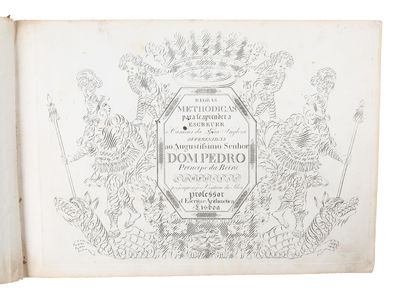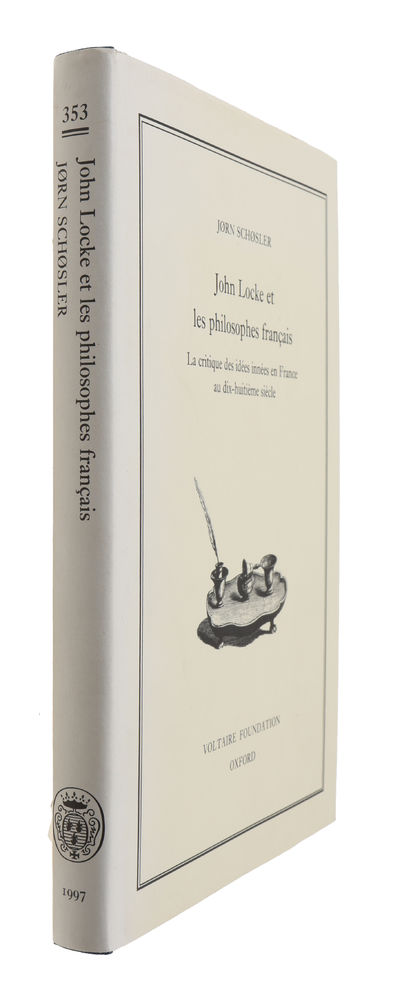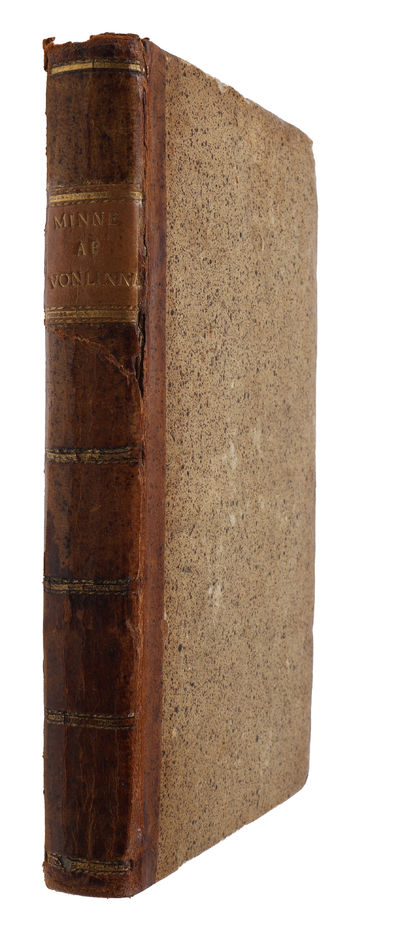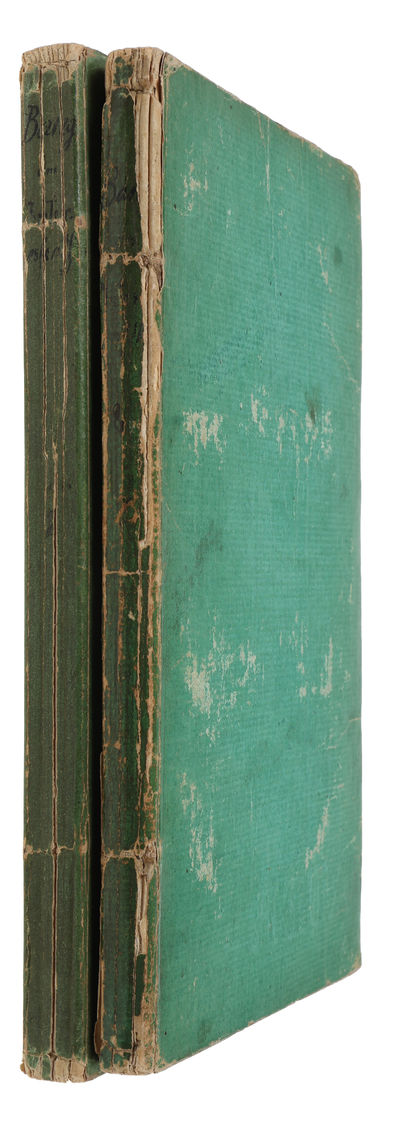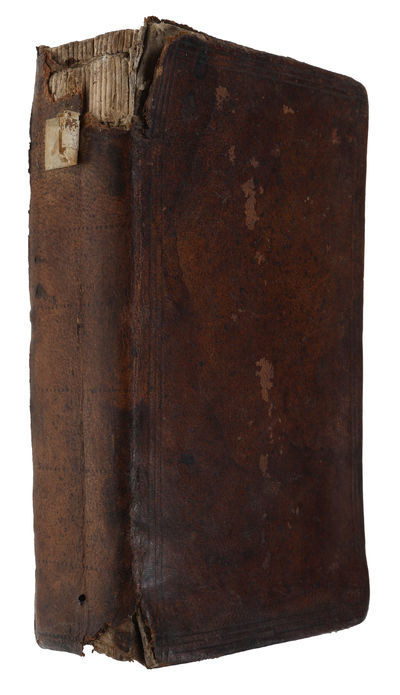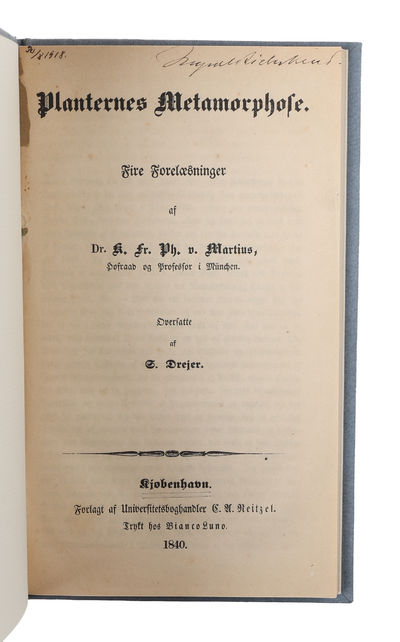WHEWELL, WILLIAM.
History of the Inductive Sciences. From the Earliest to the Present Times. In three volumes. + The Philosophy of the Inductive Sciences, Founded upon their History. In two volumes. Five volumes in all. - [COINING THE TERM "SCIENTIST"]
Herman H. J. Lynge & Søn A/S
lyn60345
London, 1837 + London, 1840. Five volumes 8vo. Bound in five contemporary, uniform brown half calf bindings (The Philosophy...-volumes slightly darker brown) with raised bands and gilt spines. Marbled edges. A bit of light edge-wear, but overall very fine and fresh. Some marginal pencil markings to first part of vol. 1 of "The Philosophy...", otherwise also internally very nice and clean. All five volumes with the same engraved amorial bookplate to inside of front boards. A very nice, uniform set of the five volumes that make up the two works. XXXVI, 437, (3); XI, (1), VI pp., pp. (7)-534, (2); XII, 624 pp. + CXX, 523, (1); IV, 586 pp. + folded plate.
Uncommon first editions of both these splendid works (the "Philosophy" is particularly scarce), Whewell's two main works, both seminal in the history of science and philosophy of science. The first of the two works, the "History" is considered "one of the important surveys of science from the Greeks to the nineteenth century" (DSB), and it is in the second of them, "The Philosophy..." - "one of the masterpieces of Victorian philosophy of science" (DSB) - that he coins the word "scientist", to describe a cultivator of science in general. “William Whewell (1794–1866) was one of the most important and influential figures in nineteenth-century Britain. Whewell, a polymath, wrote extensively on numerous subjects, including mechanics, mineralogy, geology, astronomy, political economy, theology, educational reform, international law, and architecture, as well as the works that remain the most well-known today in philosophy of science, history of science, and moral philosophy. He was one of the founding members and a president of the British Association for the Advancement of Science, a fellow of the Royal Society, president of the Geological Society, and longtime Master of Trinity College, Cambridge. In his own time his influence was acknowledged by the major scientists of the day, such as John Herschel, Charles Darwin, Charles Lyell and Michael Faraday, who frequently turned to Whewell for philosophical and scientific advice, and, interestingly, for terminological assistance. Whewell invented the terms “anode,” “cathode,” and “ion” for Faraday. In response to a challenge by the poet S.T. Coleridge in 1833, Whewell invented the English word “scientist;” before this time the only terms in use in that language were “natural philosopher” and “man of science”.” (SEP). "First published in 1840, this two-volume treatise by Cambridge polymath William Whewell (1794-1886) remains significant in the philosophy of science. The work was intended as the 'moral' to his three-volume History of the Inductive Sciences (1837)... Building on philosophical foundations laid by Immanuel Kant and Francis Bacon, Whewell opens with the aphorism 'Man is the Interpreter of Nature, Science the right interpretation'. Volume 1 contains the majority of Whewell's section on 'ideas', in which he investigates the philosophy underlying a range of different disciplines, including pure, classificatory and mechanical sciences. Whewell's work upholds throughout his belief that the mind was active and not merely a passive receiver of knowledge from the world. A key text in Victorian epistemological debates, notably challenged by John Stuart Mill and his System of Logic, Whewell's treatise merits continued study and discussion in the present day." (Cambridge University Press). "From the late 1830's until his death, Whewell worked mainly in the history and philosophy of science. His three-volume "History of the Inductive Sciences" appeared in 1837; in 1838 he was appointed professor of moral philosophy; and the first edition of his two-volume "The Philosophy of the Inductive Sciences, Founded Upon Their History" was published in 1840. Both the "History" and the "Philosophy" were ambitious works, and together they constitute Whewell's major scholarly achievement. The "History" had no rivals in its day and remains, despite unevenness, one of the important surveys of science from the Greeks to the nineteenth century. Whewell appreciated the importance of Greek science, especially astronomy, but showed typical disregard for the contributions of medieval scientists. His assessment of the importance of contributions of such major figures as Galileo and Descartes suffers from a heavy intrusion of religious and philosophical biases. But his treatment of Newton and other modern mathematical scientists is fair and sometime brilliant, and is based throughout upon detailed considerations of texts. Wheweel's "Philosophy" stimulated major philosophical exchanges between its author and Sir John Herschel, Augustus De Morgan, Henry L. Mansel, and John Stuart Mill. Alongside Mill's "System of Logic" and Herschel's "Preliminary Discourse on the Study of Natural Philosophy", the work ranks as one of the masterpieces of Victorian philosophy of science. Whewell's effort in these works was unique in his attempt to derive a philosophy of science from the general features of the historical development of empirical science. The importance of this attempt has not been fully appreciated. Whewell thought that the history of science displayed a progressive movement from less to more general theories, from imperfectly understood facts to basic sciences built upon a priori foundations that he called "Fundamental Ideas." All science was theoretical in that no body of data comes to us selforganized; even collection of data involves the imposition of a guiding interpretive idea. Major advances in science occur in what Whewell called an "Inductive Epoch," a period in which the basic ideas of a science are well understood by one or more scientists, and in which the generality and explanatory power of a science are seen to be much more illuminating than those of rival theories. Each such "Epoch" had a "Prelude," a period in which older theories experienced difficulties and new ideas were seen to be required, and a "Sequel," a period in which the new theory was applied and refined. Largely ignoring the British tradition of empiricist philosophy and methodology, Whewell erected a philosophy of science upon his understanding of history that derived partly from Kant and Plato, and partly from an anachronistic theological position. Like his British predecessors, he thought that induction was the basic method of science. He understood induction not as a form of inference from particulars to generalizations, but as a conceptual act of coming to see that a group of data can best be understood and organized (his term was "colligated") under a certain idea. Furthermore, induction was demonstrative in that it yields necessary truths, propositions the logical opposites of which cannot be clearly conceived. The zenith of the inductive process was reached when a "consilience of inductions" took place-when sets of data previously considered disjoint came to be seen as derivable from the same, much richer theory. Although Whewell thought that the paradigm form of a scientific theory was deductive, he departed from the orthodox hypothetico-deductivist view of science by claiming that tests of the acceptability of given theories are extraevidential, based on considerations of simplicity and consilience. He made some attempt to justify the necessity of the conclusions that induction yields by arguing for the identity of facts and theories, and for the theological view that we know the world the way it is because that is the way God made it. In physical astronomy Whewell's work on the tides ranks second only to that of Newton. Also of great importance was his lifelong effort to modernize and improve science education at Cambridge. The achievement in history and philosophy of science probably is less significant, although recent revival of interest in Whewell has centered mainly upon his insights in philosophy of science and methodology. Interest is growing in the interrelations of history and philosophy of science; and so long as this interest continues to be fruitful, it will be well worthwhile considering what Whewell had to say on the nature of scientific discovery, inductive methodology, and the characteristics of scientific progress." (DSB, XIV, pp 293-94)
Uncommon first editions of both these splendid works (the "Philosophy" is particularly scarce), Whewell's two main works, both seminal in the history of science and philosophy of science. The first of the two works, the "History" is considered "one of the important surveys of science from the Greeks to the nineteenth century" (DSB), and it is in the second of them, "The Philosophy..." - "one of the masterpieces of Victorian philosophy of science" (DSB) - that he coins the word "scientist", to describe a cultivator of science in general. “William Whewell (1794–1866) was one of the most important and influential figures in nineteenth-century Britain. Whewell, a polymath, wrote extensively on numerous subjects, including mechanics, mineralogy, geology, astronomy, political economy, theology, educational reform, international law, and architecture, as well as the works that remain the most well-known today in philosophy of science, history of science, and moral philosophy. He was one of the founding members and a president of the British Association for the Advancement of Science, a fellow of the Royal Society, president of the Geological Society, and longtime Master of Trinity College, Cambridge. In his own time his influence was acknowledged by the major scientists of the day, such as John Herschel, Charles Darwin, Charles Lyell and Michael Faraday, who frequently turned to Whewell for philosophical and scientific advice, and, interestingly, for terminological assistance. Whewell invented the terms “anode,” “cathode,” and “ion” for Faraday. In response to a challenge by the poet S.T. Coleridge in 1833, Whewell invented the English word “scientist;” before this time the only terms in use in that language were “natural philosopher” and “man of science”.” (SEP). "First published in 1840, this two-volume treatise by Cambridge polymath William Whewell (1794-1886) remains significant in the philosophy of science. The work was intended as the 'moral' to his three-volume History of the Inductive Sciences (1837)... Building on philosophical foundations laid by Immanuel Kant and Francis Bacon, Whewell opens with the aphorism 'Man is the Interpreter of Nature, Science the right interpretation'. Volume 1 contains the majority of Whewell's section on 'ideas', in which he investigates the philosophy underlying a range of different disciplines, including pure, classificatory and mechanical sciences. Whewell's work upholds throughout his belief that the mind was active and not merely a passive receiver of knowledge from the world. A key text in Victorian epistemological debates, notably challenged by John Stuart Mill and his System of Logic, Whewell's treatise merits continued study and discussion in the present day." (Cambridge University Press). "From the late 1830's until his death, Whewell worked mainly in the history and philosophy of science. His three-volume "History of the Inductive Sciences" appeared in 1837; in 1838 he was appointed professor of moral philosophy; and the first edition of his two-volume "The Philosophy of the Inductive Sciences, Founded Upon Their History" was published in 1840. Both the "History" and the "Philosophy" were ambitious works, and together they constitute Whewell's major scholarly achievement. The "History" had no rivals in its day and remains, despite unevenness, one of the important surveys of science from the Greeks to the nineteenth century. Whewell appreciated the importance of Greek science, especially astronomy, but showed typical disregard for the contributions of medieval scientists. His assessment of the importance of contributions of such major figures as Galileo and Descartes suffers from a heavy intrusion of religious and philosophical biases. But his treatment of Newton and other modern mathematical scientists is fair and sometime brilliant, and is based throughout upon detailed considerations of texts. Wheweel's "Philosophy" stimulated major philosophical exchanges between its author and Sir John Herschel, Augustus De Morgan, Henry L. Mansel, and John Stuart Mill. Alongside Mill's "System of Logic" and Herschel's "Preliminary Discourse on the Study of Natural Philosophy", the work ranks as one of the masterpieces of Victorian philosophy of science. Whewell's effort in these works was unique in his attempt to derive a philosophy of science from the general features of the historical development of empirical science. The importance of this attempt has not been fully appreciated. Whewell thought that the history of science displayed a progressive movement from less to more general theories, from imperfectly understood facts to basic sciences built upon a priori foundations that he called "Fundamental Ideas." All science was theoretical in that no body of data comes to us selforganized; even collection of data involves the imposition of a guiding interpretive idea. Major advances in science occur in what Whewell called an "Inductive Epoch," a period in which the basic ideas of a science are well understood by one or more scientists, and in which the generality and explanatory power of a science are seen to be much more illuminating than those of rival theories. Each such "Epoch" had a "Prelude," a period in which older theories experienced difficulties and new ideas were seen to be required, and a "Sequel," a period in which the new theory was applied and refined. Largely ignoring the British tradition of empiricist philosophy and methodology, Whewell erected a philosophy of science upon his understanding of history that derived partly from Kant and Plato, and partly from an anachronistic theological position. Like his British predecessors, he thought that induction was the basic method of science. He understood induction not as a form of inference from particulars to generalizations, but as a conceptual act of coming to see that a group of data can best be understood and organized (his term was "colligated") under a certain idea. Furthermore, induction was demonstrative in that it yields necessary truths, propositions the logical opposites of which cannot be clearly conceived. The zenith of the inductive process was reached when a "consilience of inductions" took place-when sets of data previously considered disjoint came to be seen as derivable from the same, much richer theory. Although Whewell thought that the paradigm form of a scientific theory was deductive, he departed from the orthodox hypothetico-deductivist view of science by claiming that tests of the acceptability of given theories are extraevidential, based on considerations of simplicity and consilience. He made some attempt to justify the necessity of the conclusions that induction yields by arguing for the identity of facts and theories, and for the theological view that we know the world the way it is because that is the way God made it. In physical astronomy Whewell's work on the tides ranks second only to that of Newton. Also of great importance was his lifelong effort to modernize and improve science education at Cambridge. The achievement in history and philosophy of science probably is less significant, although recent revival of interest in Whewell has centered mainly upon his insights in philosophy of science and methodology. Interest is growing in the interrelations of history and philosophy of science; and so long as this interest continues to be fruitful, it will be well worthwhile considering what Whewell had to say on the nature of scientific discovery, inductive methodology, and the characteristics of scientific progress." (DSB, XIV, pp 293-94)
Address:
Silkegade 11
DK-1113 Copenhagen Denmark
Phone:
CVR/VAT:
DK 16 89 50 16
Email:
Web:
![History of the Inductive Sciences. From the Earliest to the Present Times. In three volumes. + The Philosophy of the Inductive Sciences, Founded upon their History. In two volumes. Five volumes in all. - [COINING THE TERM "SCIENTIST"] (photo 1)](https://d3525k1ryd2155.cloudfront.net/h/498/400/1528400498.0.l.jpg)
![History of the Inductive Sciences. From the Earliest to the Present Times. In three volumes. + The Philosophy of the Inductive Sciences, Founded upon their History. In two volumes. Five volumes in all. - [COINING THE TERM "SCIENTIST"] (photo 2)](https://d3525k1ryd2155.cloudfront.net/h/498/400/1528400498.1.l.0.jpg)
![History of the Inductive Sciences. From the Earliest to the Present Times. In three volumes. + The Philosophy of the Inductive Sciences, Founded upon their History. In two volumes. Five volumes in all. - [COINING THE TERM "SCIENTIST"] (photo 3)](https://d3525k1ryd2155.cloudfront.net/h/498/400/1528400498.2.l.0.jpg)
![History of the Inductive Sciences. From the Earliest to the Present Times. In three volumes. + The Philosophy of the Inductive Sciences, Founded upon their History. In two volumes. Five volumes in all. - [COINING THE TERM "SCIENTIST"] (photo 4)](https://d3525k1ryd2155.cloudfront.net/h/498/400/1528400498.3.l.0.jpg)
![History of the Inductive Sciences. From the Earliest to the Present Times. In three volumes. + The Philosophy of the Inductive Sciences, Founded upon their History. In two volumes. Five volumes in all. - [COINING THE TERM "SCIENTIST"] (photo 5)](https://d3525k1ryd2155.cloudfront.net/h/498/400/1528400498.4.l.0.jpg)
![History of the Inductive Sciences. From the Earliest to the Present Times. In three volumes. + The Philosophy of the Inductive Sciences, Founded upon their History. In two volumes. Five volumes in all. - [COINING THE TERM "SCIENTIST"] (photo 6)](https://d3525k1ryd2155.cloudfront.net/h/498/400/1528400498.5.l.0.jpg)
![History of the Inductive Sciences. From the Earliest to the Present Times. In three volumes. + The Philosophy of the Inductive Sciences, Founded upon their History. In two volumes. Five volumes in all. - [COINING THE TERM "SCIENTIST"] (photo 7)](https://d3525k1ryd2155.cloudfront.net/h/498/400/1528400498.6.l.0.jpg)
![History of the Inductive Sciences. From the Earliest to the Present Times. In three volumes. + The Philosophy of the Inductive Sciences, Founded upon their History. In two volumes. Five volumes in all. - [COINING THE TERM "SCIENTIST"] (photo 8)](https://d3525k1ryd2155.cloudfront.net/h/498/400/1528400498.7.l.0.jpg)
![History of the Inductive Sciences. From the Earliest to the Present Times. In three volumes. + The Philosophy of the Inductive Sciences, Founded upon their History. In two volumes. Five volumes in all. - [COINING THE TERM "SCIENTIST"] (photo 9)](https://d3525k1ryd2155.cloudfront.net/h/498/400/1528400498.8.l.0.jpg)
